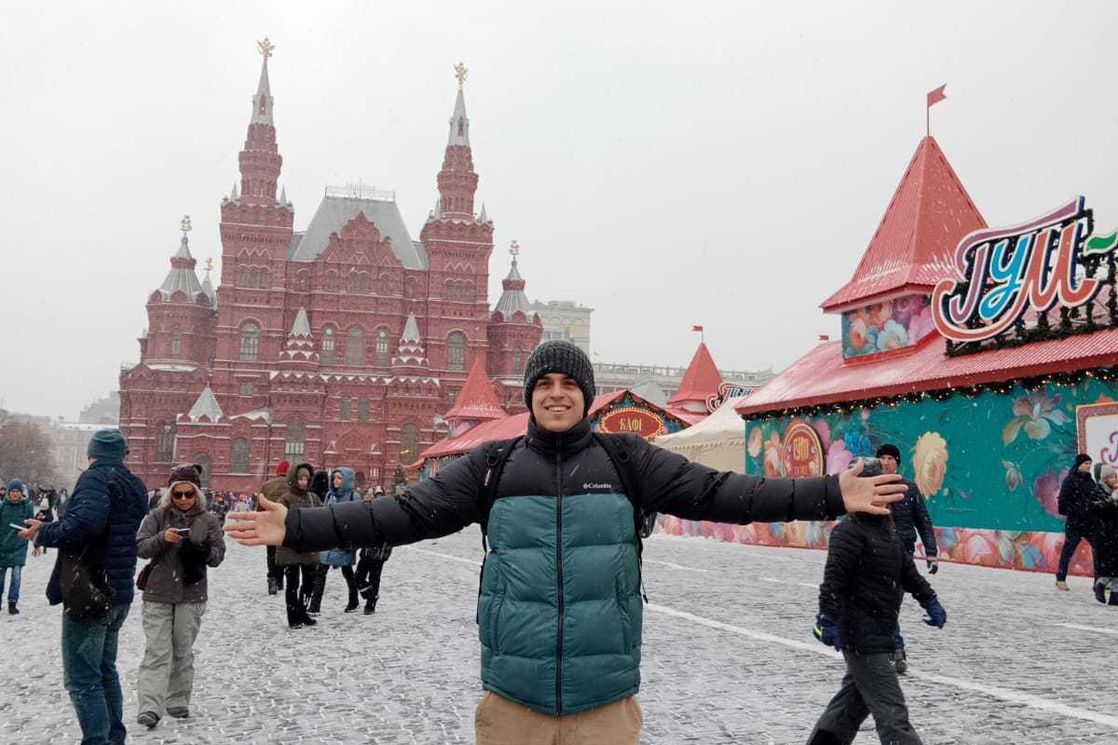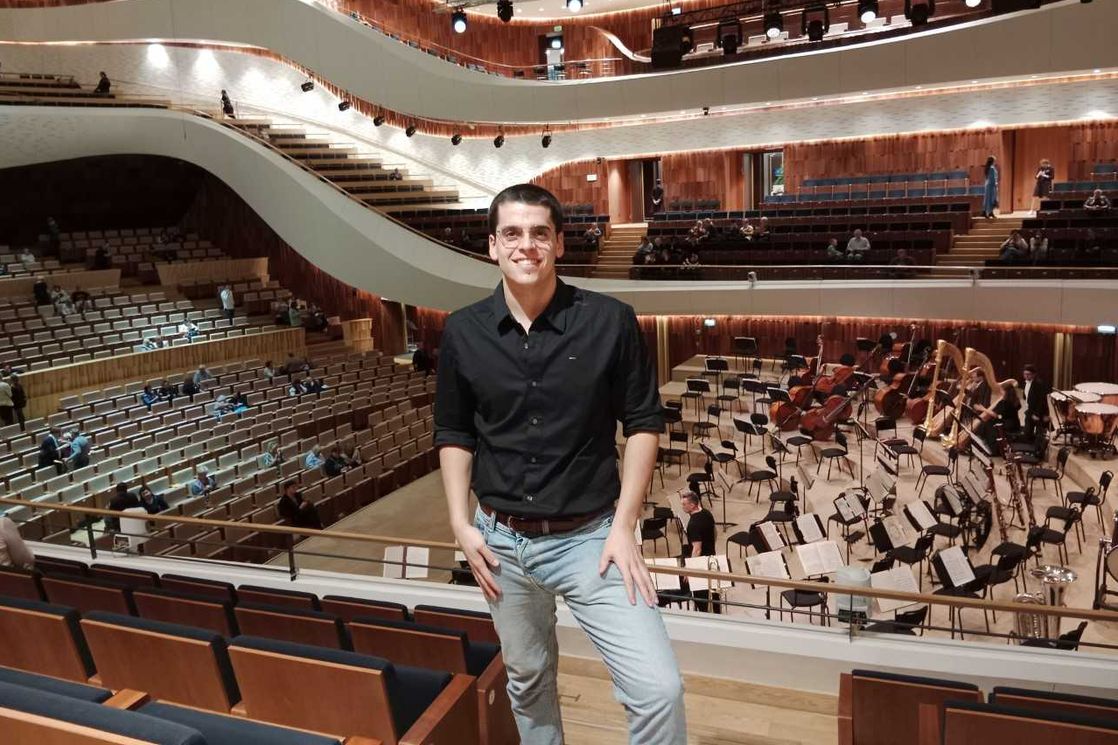ŌĆśDo Not Hesitate, Moscow Will Not Disappoint YouŌĆÖ
.jpg)
Sergio Terrón, 27, from Alicante, Spain, is a first-year student of the Master's programme in Socioeconomic and Political Development of Modern Asia at the Faculty of World Economy and International Affairs of HSE University in Moscow. His main research interest is bilateral relations between China and Spain. What do students need to succeed in their studies at HSE? What does Moscow have to offer to international students? Sergio talked about these and some other issues in his interview for the HSE News Service.
— Why did you decide to come to Moscow to study and how did you choose HSE University?
— During my stay as an exchange student in Shanghai, a colleague and friend told me about HSE University, its programmes and the scholarships I could apply for. I began to investigate and learn about the various programmes offered. I had several meetings with teachers, as well as with friends who lived in Moscow, and finally, I was convinced to embark on this adventure.
— How was the admission process?
— The application process was dynamic, fast and organised. The website to make the request is intuitive and easy to use, so I had no problems taking this first step.
Once I had my resume reviewed, I went through several interviews.
The interviews I found quite interesting as I had the opportunity to speak with those responsible for the programme and express my motivation for being part of these studies
The communication was fluid, and I did not have any problems with the administrative team or the academic team. It seems that the whole process went well, and here I am, in Moscow.
— Which courses did you find particularly interesting and why? Is it difficult to study?
— During my first year of the Master’s degree in Socioeconomic and Political Development of Modern Asia, I had the opportunity to meet professors and students with a highly competitive level in regional studies, Asian studies, and international relations.
The programme is multidisciplinary, giving the opportunity, through courses and elective subjects, to focus your studies and converge them with your academic interests
Some of the subjects that caught my attention the most and that I would like to highlight are National Security in the Asia-Pacific Region, Technological Cooperation between China and the EU, and International Politics in the Middle East.
The university is very technological, so assignments could be followed in person, online or even in a hybrid model, depending on the teacher and the dynamics of the subject.
The difficulty of these studies depends on the student. They are higher education; therefore, a degree of commitment and self-demand is needed to exceed the requirements. However, I believe that any motivated and interested student will succeed in their studies.

— Do you communicate with other Russian and international students outside of classes and how?
— I had a Buddy upon my arrival in Moscow. I think it is an ideal and very necessary initiative, especially for the first days and weeks in which bureaucratic and administrative issues must be carried out and resolved. I highly recommend new students who are planning to come to use this option. All the Buddies speak English perfectly, know how the university works, and know the city very well.
I am making many friends, both Russian and international, with whom we create different plans outside of the University. I live in one of the residences offered by the University, therefore, I had the opportunity to find and meet many more students from all over the world, studying in other programmes.
Moscow has a lot to offer, so we go out and explore the city whenever we can and studies allow. With the University student card we receive good discounts at different sites and places of interest in the city
— Tell us more about living in Moscow.
— I live right next to VDNKH park, in one of the dormitories that the University offers. I am very happy with the residence, since it is located in a quiet neighbourhood, close to several parks, with the necessary services and just a few minutes from the metro station that takes me to the city centre and the faculty in a few minutes.
I love the city. It is a fast, dynamic, historical, beautiful, clean city with infinite culture and leisure. It is impossible to get bored in Moscow. My favourite place, which I try to visit as often as possible, is Red Square. I will never get tired of visiting it and seeing St Basil's Cathedral and the Kremlin. I also visit museums, exhibitions, and go to classical music concerts. My favourite museum is the Tretyakov Gallery.
Moscow is practically a museum in itself, so, during my free time, I like to have coffee, put on my headphones, listen to music, and get lost in the city
I like to take the metro, stop at a random station and explore that part of the city.
Another plan that I really like is to visit the countless parks that exist in Moscow. Now, with the arrival of spring, they are full of flowers and plants of beautiful colours. My colleagues and I, we like to go play sports and then go have dinner at a restaurant.
I had the opportunity to go to Sergiev Posad and visit its beautiful monastery. It was incredible. Plus, I got to try authentic Russian cuisine: I loved the caviar and borsch.
— How is your Russian?
— I still don't speak much Russian. It is a difficult language, although with the course that the University offers and being able to practice it in daily life, it is an opportunity. My goal is to continue learning and be able to reach a good level.

— How do your friends and family react when you study so far from home? What do you miss most about your home country?
— It was difficult at first, to be honest.
It was not an easy decision to come and study so far from home and my family
However, once I arrived and settled in the city, and showed them the people I was meeting and the experiences I was having, they were much calmer and happier.
There has not yet been an opportunity for them to come visit me, however, I am trying to convince them to come and see me so I can show them everything this city has to offer.
Without a doubt, what I miss most is my family. Plus, I miss the food. I'm from Spain, and I'm not saying that I don't like Russian food and the weather, but I miss the Mediterranean.
— What are your professional plans? Where would you like to work, let’s say in ten years?
— To be honest, I'm still not sure where I will be in 10 years. The academic world interests me and I would like to continue with a doctoral programme when I finish this master’s degree. It would be nice to be able to collaborate in some way with the university in the future, either as a guest professor, in presentations or round tables. Maybe, in ten years, I will be a teacher at HSE University.
This is undoubtedly one of the most incredible experiences I have ever had. I would like to convey to any student who is considering coming, do not hesitate, Moscow will not disappoint you.
See also:
Alliance of 4 Plus the HSE
On October 10th HSE staff met with representatives of the Alliance of 4 Universities of Spain (A-4U): the Autonomous University of Barcelona, the Autonomous University of Madrid, Charles III University of Madrid and the Pompeu Fabra University. Boris Zhelezov, Deputy Vice Rector of the HSE, told us about the outcomes of the meeting.


